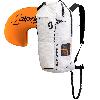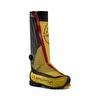Alpine light pollution doubles
According to the University of Bern, Switzerland, light pollution in the Alps has doubled in the last 15 years.
| When we talk about pollution, we often forget that there is also another form of pollution, namely the brightness and darkness of our night skies. With an increase in population density and the reduction of air quality, more and more people find themselves unable to see the constellations our ancestors once gazed at. But the problem is about much more than just reduced visibility and beautiful stars: the increase in night luminosity implicates an incredible energy increase and waste, other than the disruption of nocturnal habits of many plant species and animals (for example, wrong migration routes due to reduced visibility of the stars and moon leading to exhaustion and death). Below we've published the latest press release of the WWF Italy, which highlights how in the Alps night luminosity has doubled over the last 15 years. The photos elaborated by the University of Bern, published right, provide ample food for thought. And for those wishing to delve deeper into the subject, we recommend the following website: Campaign for Dark Skies ALPINE SKIES TOO BRIGHT Swiss study reveals how luminosity has doubled The WWF European Alps program has published a report by the Swiss University of Bern which, on the basis on satellite images, illustrates an increase in night illumination in the entire alpine region during the last 15 years. The changes are particularly noticeable on the outskirts of the Alps, in particular the Italian city Milan and the central areas of Switzerland, which have now become seas of light. Between 1992 and 200 the surface area with particularly strong lights has doubled and the light intensity has increased significantly. The reasons for this increase can be found in the increase in houses and roads, and the increase in lights used for advertising or decorative purposes. Increased night luminosity affects many animals and plant species and not only environmentalists are calling for darkness to be protected as a natural resource. WWF Italy |
| |||||||||||||
Latest news
Expo / News
Expo / Products
The Zenith is a mountaineering axe that uniquely combines lightweight design with technical features for top-level performance.
Technical footwear for high altitude mountaineering and ice climbing.
Ever since its market launch, the Barryvox avalanche transceiver has been among the most reliable transceivers in the world.
Ocun Diamond S climbing shoes designed for maximum performance, comfort, and precision
25 Liter backpack with avalanche bag
The world’s lightest – and most technically advanced – high altitude mountaineering boots.



 Copia link
Copia link

























